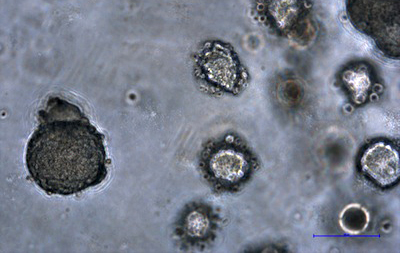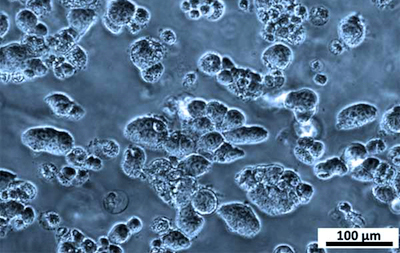Simply incredible 3D cell cultures
PGmatrix™ is a powerful and yet easy-to-use tool for in-vitro 3D cell cultures with high-throughput screening and accurate in vivo predictions for life science research and development.
Easy to use and highly effective
PGmatrix is incredibly easy to use and allows you to get accurate results faster than ever. Unlike traditional 3D cell culture systems, PGmatrix requires no complicated steps for preparation, no pre-chilled gel solutions, and no toxic cross-linking reagents.
The PGmatrix-Spheroids system is designed to mimic the natural extracellular matrix (ECM), a 3D network matrix composed of fibrous matrix that provides structural integrity for cell survival, with a system that can be handled at room conditions and physiological conditions.
The PGmatrix-Spheroid system is an advanced 3D model for effective and highly predictive development in arenas of drug discovery, disease modeling, cell therapy and regenerative medicine, particularly for fighting COVID-19.
The PGmatrix-Spheroid system is designed for either static well plate 3D cultures, scalable motional 3D cell, spheroid manufacturing in vivo delivery, or live spheroid shipping.
- No acidic or chill pre-gel solution
- Cells are easily encapsulated
- Purified synthetic peptides in neutral pH
- Cell suspension at room temperature
- Mimics cell micro-environment
- Fast hydrogel formation (in minutes)
- Works with standard methodologies
- Easy 3D culture harvesting
A regular PGmatrix research kit includes 6ml of 1% W/V PGmatrix nanofiber solution and 0.3ml of PGworks solution. Most cells grow well in PGmatrix concentration from 0.2-0.5% W/V).
Use Cases
PGmatrix has been used by researchers to create many different types of cell lines. The list below should help you decide what is the best product to order for your use case:
| Product | Cell Lines tested in PepGel in 3D |
| PGmatrix MEM | Breast cancer cell MCF-7 |
| PGmatrix L-15 | Breast cancer cells MDA-MB-231 & MDA-MB-468 |
| PGmatrix DMEM | Head and neck squamous cell carcinoma HN5, Ham’ F12 skin cell, HeLa cancer cell Liver cells Endothelial cells Islet cells Mouse Stem cells Pig stem cells human fibroblast cell lines, human glioblastoma stem like cells T-cells – Jurkat cells, CHO-S |
| PGmatrix RPMI | ZR-75 Prostate cancer cell (LNCaP) Islet cells, Lymphoma cells |
| PGmatrix DMEM* GFs | hiPSC derived from human fibroblast MSCs |
| PGmatrix Customized | Human ESCs, iPSCs, MSCs |
| PGmatrix Spheroids | HeLa cells Head and neck cells Human adipose-derived mesenchymal stem cells hiPSC derived from human fibroblast A549 LET 1 PMEC HEPG2 SW480 HCT116 PANC 1 4t1 FHC |
| PGmatrix hiPSC | hiPSC derived from human fibroblast Episomal hiPSC |
Case Studies
PGmatrix has been used successfully in the creation of cell lines from cancer cells and stem cells. Click on the images below to read about recent success stories.


Researchers have used PGmatrix in the creation of other cell lines, including MDA-MB-231 and MDA-MB-468 human breast cancer cells, head and neck squamous cell carcinoma HN5, Rat embryonic stem cells (ESC), and rat induced pluripotent stem cells (iPSC).
In addition, PGmatrix has recently been successfully used in cell lines for stem cells (MSC), skin cells (Ham’s F12), prostate cancer cells (LNCaP), and HeLa cancer cells.
3D cell culture products
- PGmatrix System
- PGmatrix Spheroid Kit
- PGmatrix hiPSC Kit
- PGmatrix LiveShip Kit
- PGmatrix 3D Suspension hiPSC Kit
- PGmatrix BioInk Kit
Other publications
- Heart/liver-on-a-chip as a model for the evaluation of cardiotoxicity induced by chemotherapies, Organs-on-a-Chip, 2021, Vol 3.
- Universal Peptide Hydrogel for Scalable Physiological Formation and Bioprinting of 3D Spheroids from Human Induced Pluripotent Stem Cells, Advanced Functional Materials, 2021, Vol 31, Issue 41.
- 3D h9e peptide hydrogel: An advanced three-dimensional cell culture system for anticancer prescreening of chemopreventive phenolic agents, Toxicology in Vitro 61 (2019) 104599.
- 3D-printing enabled micro-assembly of a microfluidic electroporation system for 3D tissue engineering, Lab Chip, 2019, 19, 2362.
- 3D cell culture stimulates the secretion of in vivo like exosomes, Scientific ReportS | (2019) 9:13012.
- Anticancer Drug Camptothecin Test in 3D Hydrogel Networks with HeLa cells, Scientific Reports 7, 01 February 2017.
- hiPSC-qualified PGmatrix™ – case study, 2017.
- Controlled release of BSA-linked cisplatin through a PepGel self-assembling peptide nanofiber hydrogel scaffold, Amino Acids: The Forum for Amino Acid, Peptide and Protein Research, 29 May 2017.
- Design and Demonstration of a Pumpless 14 Compartment Microphysiological System, Biotechnol. Bioeng. 2016;113: 2213–2227.
- Mitigation of Tumor-Associated Fibroblast-Facilitated Head and Neck Cancer Progression With Anti–Hepatocyte Growth Factor Antibody Ficlatuzumab, JAMA Otolaryngol Head Neck Surg. 2015.
- Peptide Hydrogelation and Cell Encapsulation for 3D Culture of MCF-7 Breast Cancer Cells, PLOS ONE, 2013, e59482. March 20, 2013